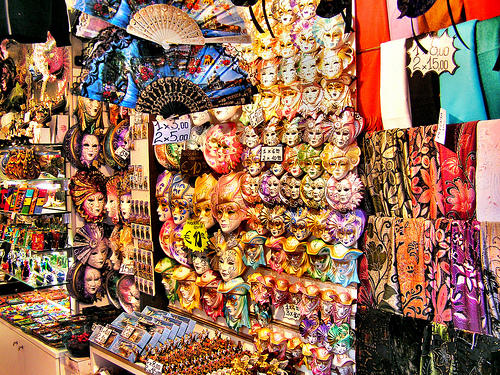Shopping - Lesson 10 - Conversation:
In un negozio di articoli da regalo
(In a souvenir shop)
(photo
by Yilmaz Oevuenc used
under terms of Creative Commons license.)

|
Signora Smith: |
Può mostrarmi quella tovaglia? Quanto costa? |
|
Commessa: |
400.000 lire. È piuttosto cara, ma il ricamo
è fatto a mano. |
|
Signora Smith: |
Si, è troppo cara. Non ha qualcosa di meno
caro? |
|
Commessa: |
C’è questa qui a 220.500 lire. È anche molto carina. |
|
Signora Smith: |
Si, mi piace. |
|
Don Smith: |
Può farci un buon prezzo? |
|
Commessa: |
Mi dispiace. Abbiamo i prezzi fissi. |
|
Don Smith: |
Bene, d'accordo. Vorrei anche questi due
portacenere e quella statuetta. |
|
Commessa: |
Va bene, Signore. In tutto fanno 440.500 lire. |
Translation:
|
Mrs. Smith: |
Can you show me that
tablecloth? How much does it cost? |
|
Salesperson: |
400,000 lire. It's rather
expensive, but the embroidery is handmade. |
|
Mrs. Smith: |
Yes, it's too expensive. Don't
you have something less expensive? |
|
Salesperson: |
There is this one at 220,500
lire. It's very pretty, too. |
|
Mrs. Smith: |
Yes, I like it. |
|
Don Smith: |
Can you give us a good price? |
|
Salesperson: |
I'm sorry. We have fixed prices. |
|
Don Smith: |
Well, agreed. I'd like also
these two ashtrays and that little statue. |
|
Salesperson: |
All right, sir. That comes to
440,500 lire. |
Notes on conversation
1. You will be pleasantly surprised
at the variety and
volume of goods available on the local Italian market. Whether it refers to shoes, high
fashion, cars, or
many other items, "Made in
2. Cara means "expensive" and "dear." For example, La tovaglia è cara, "The tablecloth is expensive;" or, la mia cara moglie, "my dear wife."
3. The suffix etto/a attached to a noun means "little." For example, statuetta, piccola statua; vasetto, piccolo vaso.